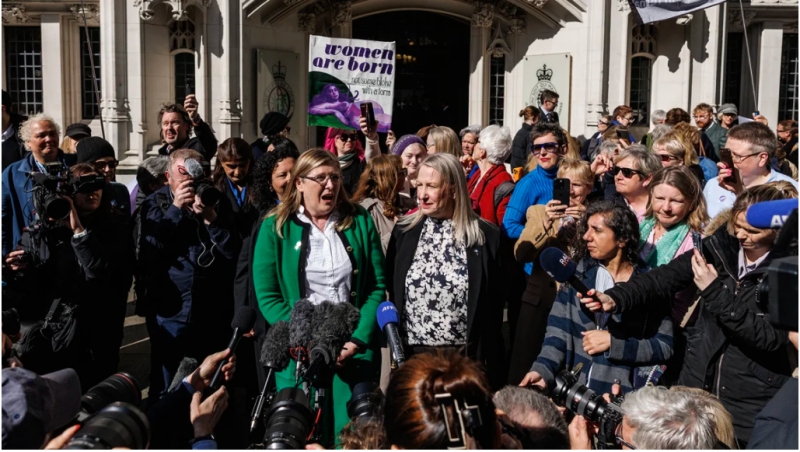
The United Kingdom’s highest court ruled that the legal definition of “woman” excludes trans women, in a case with sweeping consequences for how equality laws are applied.
Britain’s Supreme Court ruled unanimously that the definition of a woman in equality legislation refers to “a biological woman and biological sex,” sparking celebrations outside court among gender-critical campaigners but warnings it was a “worrying” development for transgender people.
The case centered on whether trans women with a gender recognition certificate (GRC) – which offers legal recognition of someone’s female sex – are protected from discrimination as a woman under the nation’s Equality Act 2010.
A group of campaigners in Scotland brought a challenge in 2018, arguing that those rights should only safeguard those assigned as women at birth. But the Scottish government said that a trans woman with a GRC is legally a woman and should therefore be afforded the same legal protections.
Even though the case stems from a dispute over Scottish laws designed to increase the number of women sitting on boards, the outcome on Wednesday will shape the increasingly fractious and polarizing debate over transgender rights across the UK.
The UK’s ruling Labour party said the ruling brought “clarity and confidence” while the opposition Conservatives called it a “clear victory for common sense,” urging the government to amend existing guidance.
The five judges ruled in favor of For Women Scotland (FWS) – which proposed that not linking the legal definition of gender to biological sex would have repercussions on designated single-sex services, including changing rooms, hostels and communal accommodation.
“The terms woman and sex in the Equality Act 2010 refer to a biological woman and biological sex,” Lord Patrick Hodge told the court in London. “The provisions relating to sex discrimination can only be interpreted as referring to biological sex,” he added.
“Interpreting ‘sex’ as certificated sex would cut across the definitions of ‘man’ and ‘woman’ and thus the protected characteristic of sex in an incoherent way,” a summary of the ruling said, which added that transgender women could be excluded from same-sex facilities such as changing rooms if “proportionate.”
If transgender women with a GRC were afforded the same protected characteristic as biological women under the Equality Act, Hodge said, they would possess “greater rights than those who do not,” citing provisions relating to pregnancy and maternity leave.
The justice insisted that the court’s interpretation of the Equality Act 2010 “does not remove protection from trans people,” with or without a GRC document. A trans woman could claim discrimination on the grounds of gender reassignment, and because “she is perceived to be a woman,” added Hodge.
Britain’s government “has always supported the protection of single-sex spaces based on biological sex,” a spokesperson said, following the ruling.
“This ruling brings clarity and confidence, for women and service providers such as hospitals, refuges, and sports clubs,” the spokesperson added. “Single-sex spaces are protected in law and will always be protected by this Government.”
A ‘watershed for women’
Despite Lord Hodge saying that the ruling should not be read as “a triumph for one or more groups in our society at the expense of another – it is not,” gender-critical campaigners are celebrating it as a major victory.
“The court has given the right answer: the protected characteristic of sex – male and female – refers to reality, not paperwork,” said the group Sex Matters.
Another charity, the LGB Alliance, which made arguments in the case, called it a “watershed for women.”
Former Scottish National Party MP Joanna Cherry, a longtime campaigner on the issue, told PA Media outside court she felt “hugely vindicated” by the ruling, adding that it was now “over to the politicians to make sure that the law is obeyed.”
Trans activists across the globe warn that the fierce public debate over their private lives has chipped away at protection for the marginalized and regularly vilified community in recent years.
In the UK, hate crimes on the basis of sexual identity rose by 112% in 2023, according to government figures – the same year a young trans girl, Brianna Ghey, was murdered by two schoolchildren in a park in central England.
And in the US, with the advent of the Trump administration, rights groups sounded the alarm over escalating attacks on the rights of transgender and nonbinary Americans.
Amnesty International, which backed the Scottish government, previously urged lawmakers to update existing legislation, so that trans communities have a right to privacy, to marry, to family life and health, without invasive bureaucratic measures.
On Wednesday, the NGO said that the ruling could have “potentially concerning consequences for trans people, but it is important to stress that the court has been clear that trans people are protected under the Equality Act against discrimination and harassment.”
LGBTQ charity Stonewall said the UK Supreme Court’s decision was “incredibly worrying for the trans community.”
After the ruling, Ella Morgan, a British trans advocate, told CNN she was deeply fearful over how the outcome would impact “mine and other transgender women’s futures.”
“I had a feeling these changes would be implemented in the UK following the US news, I hoped that deep down I would be wrong. Today for the first time, I am scared about walking out of my front door,” she said in a statement on Wednesday.
This story has been updated.





